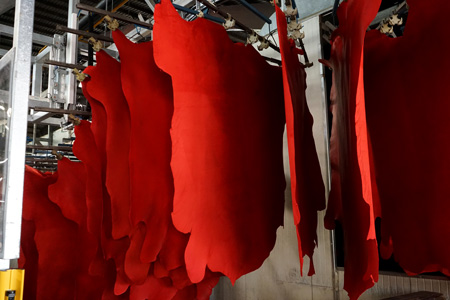- ABOUT CTC
- EXPERTISE AND SERVICES
- Raw hide - Tannery
- Footwear
- Leather goods - Glove-making
- PPE
- Environment
- CSR
- Training
- Safety of articles with ICARE
- BLOG AND NEWS
- CTC VIDEOS
- LEAFLETS AND PUBLICATIONS
- CUSTOMERS EXTRANET
EN
The facilities of French tanneries are required to undergo environmental classification (ICPE). Consequently, they must monitor their discharges of water, solvents and solid waste.
CTC can advise you on setting up, sampling and taking measurements at your discharge points.
All of CTC's services are COFRAC accredited, which guarantees the reliability of the process and ensures compliance with the relevant regulations and requirements of local authorities, such as water agencies.
In addition to sampling and analysis, CTC has established itself as a key player and partner committed to supporting the ecological and energy transition in the leather industry. We help you analyse your environmental issues, assess your current situation, and implement solutions to reduce your environmental impacts.
Environmental impacts are associated with liquid, solid and gaseous discharges, and with the consumption of raw materials such as hides, energy, chemicals and water.
The main discharges to the waste water system are from wet processing operations associated with river work, tanning and currying. Atmospheric emissions are mainly due to dry-finishing processes, but heat production systems can also produce gaseous emissions.
The main sources of solid waste are the fleshing, slitting and shaving processes.
Sewage sludge from on-site effluent treatment is another potential source of solid waste. However, some of these types of waste can be considered by-products, since they can be sold to other industries as raw materials.
The process of making leather from a raw hide involves treating the hide in a series of baths containing different chemicals. First, to remove any superfluous elements, and then to give the leather its characteristic properties (resistance to decay, suppleness, colour, etc.).
Pollution is therefore caused both by the hide itself and by incompletely absorbed reagents. Tannery effluents generally contain a load termed “organic”, mainly associated with the wet-work stages, and a mineral load, associated with the tanning and retanning stages that use chromium sulphate as a tanning agent.
In France, the regulatory framework applicable to tanneries is the ICPE (Facilities Classified for Environmental Protection) regulation, particularly section No 2350.
Monitoring the quality of water discharges is an essential part of this activity. The parameters to be monitored for pollution are set out in the company's official authorisation documents issued by the Prefecture, based on the requirements of the French ministerial decree of 2 February 1998.
In addition, the majority of existing facilities, with or without on-site effluent pre-treatment systems, are connected to the urban waste water collection network. As a result, additional monitoring parameters may exist and are formalised in a discharge agreement between the company and the local authority.

There is therefore no standard list of applicable parameters to monitor, apart from some of the most commonly encountered: BOD5, COD, suspended solids, total chromium, total metals, pH, sulphide, total nitrogen, and total phosphorus.
A decree of 23 August 2017 amended the requirements of the ministerial decree of 2 February 1998 to take into account feedback from the national campaign known as RSDE, which France carried out in the early 2000s to comply with the European Water Framework Directive (2000/60/EC) and to search for hazardous substances in water.
As a result of this amendment, some tanneries subject to the authorisation procedure may have had to modify their discharge monitoring procedures or start monitoring for certain new substances. For example, on 1 January 2020, the regulatory threshold for “4-chloro-3-methylphenol” changed to 150 µg/litre if the flow is greater than 5 g/day.